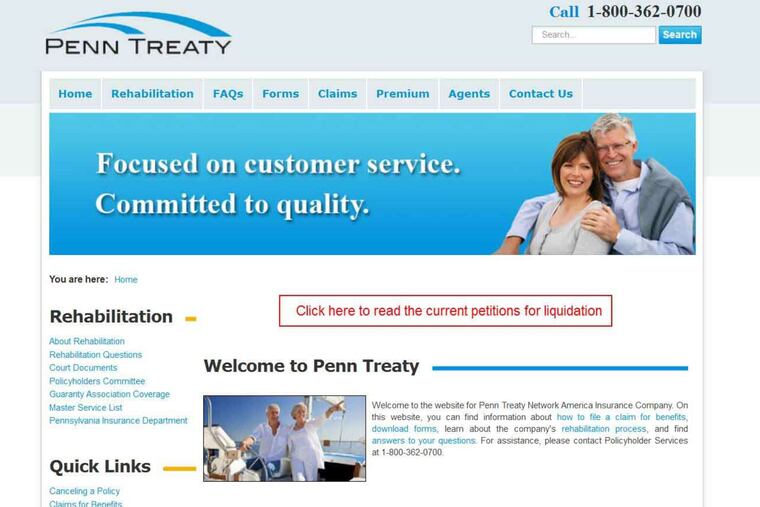Pa. braces for largest health insurance failure in U.S. history
Who pays for all the chain nursing homes that have spread across the U.S. as baby boomers age? Old folks, if they saved. Their loved ones, when they can afford it.

Who pays for all the chain nursing homes that have spread across the U.S. as baby boomers age?
Old folks, if they saved. Their loved ones, when they can afford it.
And you and I, not just through taxpayer-funded Medicaid but also through our health-insurance premiums, which go up when long-term-care insurers fail and leave more-solvent health insurers, their owners, and their customers to fund claims.
Pennsylvania insurance regulators moved in and took over Penn Treaty American Corp., once the second-largest U.S. long-term-care insurer, and put it "in rehabilitation" back in 2009. Rehabilitation is what happens to insurers instead of bankruptcy reorganization. If they can't be fixed, they are liquidated, their policies transferred to and their losses paid by solvent insurers.
The publicly traded Allentown company was seized two months after the death of founder Irving Levit because it had written state-approved policies at prices far below the real cost of care. By then, expected eventual claims for 127,000 policyholders at Penn Treaty and its affiliates had outgrown its investments, and other assets to pay them with, by $226 million, state officials told Commonwealth Court Judge Mary Hannah Leavitt.
Seven years later, Penn Treaty is still "in rehabilitation." But the deficit has grown: The state's current actuarial estimate is $4 billion. Losses grew as customers aged and actuaries recorded costs that might have passed quietly to reinsurance - a sort of insurer underworld of risk-swapping - if Penn Treaty had been liquidated when it was first taken over.
At that size, Penn Treaty would be the biggest health-insurance company failure in industry history, according to data from the National Organization of Life and Health Guaranty Associations.
Penn Treaty's loss will be covered by solvent health-
insurance companies, and passed on to their owners and policyholders, when a state plan to liquidate Penn Treaty is finally approved by Commonwealth Court. A Nov. 9 hearing is set before Leavitt.
Guaranty groups such as Pennsylvania Life & Health Guaranty Association pay costs from failures such as Penn Treaty's by assessing successful insurers a surcharge on their policies in states where the failed firms had customers.
Penn Treaty and its affiliates are so broke that their unpaid obligations for Pennsylvania are expected to top $500 million, "close to or at the 2 percent cap" for annual surcharges on Pennsylvania health-insurance policy premiums, said Sean McKenna, spokesman for the national life and health guaranty group.
More likely the state association, and those in more than 40 other states, including California and Florida, which have even more Penn Treaty customers, will spread payments over several years.
Then-Pennsylvania Insurance Commissioner Joel Ario (he later headed the first Obamacare exchanges) applied to take over Penn Treaty in April 2009, three months after the company founder's death.
Judge Leavitt allowed the takeover but did not accept the state's initial liquidation plans.
In hearings in her courtroom and in marathon discussions, regulators, creditors, bondholders, health insurers, and the company's owners, led by New York investment firm Broadbill Partners LP, fell to arguing over the corpse of Penn Treaty.
The owners didn't see why Penn Treaty couldn't just jack up its fees, as if it were a badly funded health insurer struggling to realign claims and premiums. In rulings including a scathing 2012 opinion, the judge rejected the state plan and wrote that Penn Treaty had assets to pay claims for years, if the state let it boost its rates enough.
But Ario's department, and fellow insurance regulators in other states, continued to resist large increases for Penn Treaty's aging customers. They took what they saw as a principled stand backed by the National Association of Insurance Commissioners: If Penn Treaty could greatly boost its fees as anxious customers aged, why should Americans trust long-term-care salespeople, or any insurance agent, when they promise initial rates that buyers can afford?
The state hired new experts and proposed benefit cuts. Policyholders objected. A proposal to split Penn Treaty into a good-assets and a bad-assets company was criticized by the insurers that would have to help pay for it.
In September, the owners settled: Pennsylvania agreed to pay their holding company $10 million, and the owners agreed to share tax-refund rights to nearly $1 billion in Penn Treaty's investment valuation losses with the state, in hopes that might trim the insurance losses. Leavitt approved the settlement over objections from health insurers, who complained they would have to "bear the burden" through the guaranty funds.
The deal "clears the decks" for final liquidation, Gary Hindes, a principal of New York investment firm Delaware Bay Co. who supported Broadbill's position, said at the time.
Raising rates
There are other troubled long-term-care insurers in Pennsylvania. Since Gov. Wolf took office, though, the state seems to have abandoned its old policy of resisting big rate increases by long-term-care companies that sold policies here but failed to predict the true costs of such care.
As my colleague Harold Brubaker has reported, four life-insurance companies - Genworth, Unum, John Hancock, and MetLife - have been asking for fat double-digit increases on long-term policies, and getting them from Pennsylvania officials.
Genworth told the state it lost $2 billion on policies sold from 1974 to 2002 and needs to charge more so it can afford to stay in the business.
Of course, that makes sense for the insurance business and its owners; it also protects the general public from more expensive Penn Treaty-style cleanups. But the message to its long-term-care customers is also clear: Buyer beware.
215-854-5194@PhillyJoeD